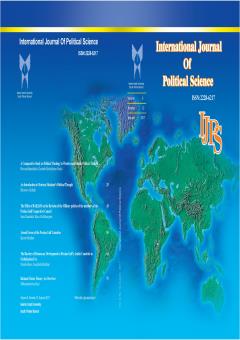Conceptual History of Tadbir-e-Manzil in the period of Translation Movement and its Sociopolitical Implications
Subject Areas :Hossein Sharifara 1 , Morteza Bahrani 2 *
1 - Applied Science and Technology University- Instructor
2 - Associate Professor of Political Science, Institute for Social and Cultural Studies (ISCS)
Keywords: Conceptual history, Tadbir-e-Manzil, Oikonomia, Translation Movement, Divansalary,
Abstract :
The concept of Tadbir-e-Manzil (household management) is a concept in history of political thought in Islam. It refers to management of household and the way family members participate in carrying out and regulating the affairs of Manzil (household). With the aim of achieving a new un-derstanding of Tadbir-e-Manzil and its formation and evolution in its semantic domain, this article’s question is a question about the origin and the nature of its concept, its semantic evolution, and its sociopolitical implications within the framework of its conceptual history and in the period of trans-lation movement. The period during which the process of translation causes an environment of cul-tural exchange that introduces a possibility of semantic comparison of concepts in relation to their sociopolitical realities. Studies show that Tadbir-e-Manzil in its conceptual origin and in its socio-political reality in ancient Greece as Oikonomia, has been a support to the concept of Greek citizen-ship, in relation to its ethics and economic production status. And then in the course of its semantic transition and change to the realm of the Islamic Iranian civilization, it has been selected and ap-plied as Tadbir-e-Manzil by Moslem scholars in relation to Islamic sociopolitical realities as well as Islamic acting space of translation movement. In fact, the main issue is that Tadbir-e-Manzil, in an obvious difference with ancient Greek Oikonomia, has been used in accordance with Islamic politi-cal reality based on individual Islamic morality and political obedience. Tadbir-e-Manzil presents Islamic innate and sublime tendencies in achieving prosperity. It also gives continuity to the acting of political reality based on Divansalary as a system managing house and household.
Abdo Rababah, Hussein (2015). The Transla-tion Movement in the Arab World: From the Pre-Islamic Era Until the end of Umayyad Dynasty (Before 610-750 A. D.), International Jour-nal of Language and Linguistics. Vol. 3, No. 3, p 130.
Falatouri, Abdoljavad (2013). The Funda-mental Transformation of Greek Philosophy in Dealing with the Method of Islamic Thought, trans-lated by Seyyed Mohammad Baqer Telgarizadeh, Tehran, Research In-stitute of Iranian Wisdom and Phi-losophy, p132.
Farabi, Mohammad (2017). Abstract Chap-ters, translated and described by Hassan Malekshahi, Tehran, So-roush Publications, p27- 28.
Galston, Mariam (2007). Virtue and Politics: Farabi's Political Philosophy, trans-lated by Hatem Ghaderi, Tehran, Baqa Publishing, p169.
Gutes, Dimitri (1998). Greek Thought, Ara-bic Culture the Graeco Arabic Trans-lation Movement in Baghdad and Early ' Abbasaid Society (2nd 4th 5th 10th C.) (Arabic Thought & Culture) Routledge, p1.
Ibn Sina, Abu Ali (2004). Theology of Ala'i Encyclopedia, edited by Mohammad Moin, Hamedan, Bu Ali Sina Inter-national Conference, Bu Ali Sina University, second edition, p 63.
Ismail, Nurizal, Antonio, Muhammad Syafii (2012). the Islamic wealth manage-ment: an analysis form Ibn Sina’s oerspective, Journal of Islamic Thought and Civilization (JITC) Volume 2, Issue 1, p24.
Koselleck, Reinhart (2002). the Practice of Conceptual History, Timing History, Spacing Concepts, California Stan-ford University Press, p xi.
Lesehem, Dotan, (2016). what did the an-cient Greek mean by Oikonomia, American Economic Association, journal of Economic Perspectives, Volume 30. No.1, p231.
Moskowiyeh, Abu Ali Ahmad (1442 AH). Tahzib al-Akhlaq, research of Hosse-in Momeni, Tehran, center for the Revival of Islamic effects, p137.
Muller, Jan-Werner (2011). on conceptual history, Journal of contemporary history, Volume: 46 issues: 3, p83.
Olsen, Nikolas (2009). Beyond utopianism and relativism: History in the plural in the work of Reinhart Koselleck, Department of History and Civiliza-tion, European University Institute, p169.
Orman, Sabri (2013). From Oikonomia to Ilm Tadbir al-Manzil-Intercivilizational Exchange of Knowledge in the Intellectual Tradi-tion of Islam”, Civilization and Val-ues, Ed. Recep Şentürk, Istanbul: Is-tanbul Chamber of Commerce and UTESAV, p179.
Palonen, Kari. (1997). An Application of Conceptual History to Itself. From Method to Theory in Koselleck's "Begriffsgeschichte", Finnish Year-book of Political Thought, Jyvasky-la, Finland: SoPhi, p49.
Requejo, Maria Dolores Porto (2007). the role of context in word meaning construction: a case study, Universi-ty of Murcia, Journal of English studies, p 170.
Rosenthal, Erwin (2004). Political Thought in Medieval Islam, Cambridge Uni-versity Press, p12.
Zakaria, Idris (2012). Ibn Sina and the Theo-ry of Management of Household, Dept. of Theology and Philosophy Faculty of Islamic Studies National University of Malaysia, Malaysia, In-ternational Journal of Business and Social Science, Vol. 3 No. 13, p 246.

